Evita
Andrew Lloyd Webber (Music); Tim Rice (Lyrics)
San Francisco Playhouse
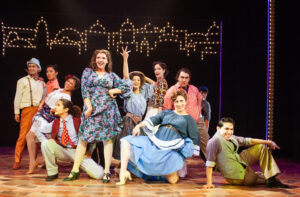
With music that ranges from solemn classical, hip-swishing Latin, and grinding rock to soaring ballads and anthems, Andrew Lloyd Webber’s Evita leaves any audience member with enough memorable earworms for a full night’s worth of dreams. The endurance of Webber’s music coupled with lyrics by Tim Rice that are now part of everyday parlance (like “Don’t Cry for Me, Argentina”) has kept this first British import to win the Tony for Best Musical (1979) in almost constant tours and revivals on stages throughout the world. In a production over-flowing with hip-swishing choreography, eye-popping costumes, rousing ensemble vocals, and uniquely conceived direction, San Francisco Playhouse brings this now-classic, normally big-stage musical to its more intimate setting to provide a close-up, fresh perspective that should prove to be a summertime hit for the City’s theatre scene.
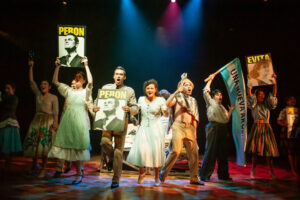
With an underlying story about a would-be politician who rises from nowhere to presidency while making largely false promises to the working class, Evita in 2024 has particular relevance as we are in the midst of many similar pledges and outright lies in a presidential election year. At the same time, the main story about a strong, determined woman who rises from poverty to the near-religious adoration of a nation is still the heartbeat of the musical and one in which SF Playhouse’s upfront, stated desire is to highlight her sometimes overlooked contributions to bettering the common people’s – especially women’s – lives in Argentina.
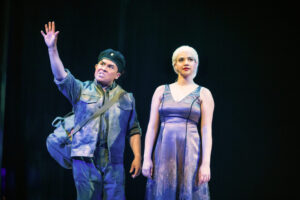
As a musical that relies totally on the lyrics of Tim Rice to tell its story (leading some to think of it more as a rock opera), Evita is a double-tracked love story between Eva Perón and her adoring husband Juan and between Eva and the lower classes of Argentina who worship her and in turn elect her husband president in 1946. In a stroke of genius, the creators install the contemporary, revolutionary Che Guevara as cynical bystander and narrator who does not buy into the sincerity of her love for either but – along with the country’s aristocracy who despise her – sees her only as a manipulator out for her own fame and fortune. That the two never met in real life is immaterial to this fictionalized accounting of Eva’s rise from actress, radio star, and mistress-to-many to become the wife of a military general who in turn — with the help of her widespread popularity among the proletariat — becomes the country’s ruler. The tension created by Che’s continually calling out what he sees as lies and deceptions while at the same time both the common people and we, the audience, are captivated and totally enthralled by the passion and beauty of Eva is what enables the story to live up to the incredible score of Andrew Lloyd Webber – a score known for its repeatable, melodic themes that become permanently etched forever into its listeners.
One of those ongoing, musical phrases is discerned in the opening “Requiem” as the entire ensemble mourns in heart-wrenching, full harmonies the 1952 passing of Eva Perón, with our hearing a quartet’s beautifully affecting strains of “Don’t Cry for Me Argentina” that will eventually become the musical’s memorable climax. But even as the mourners’ tears flow and as some collapse in grief, a watching, roaming Che sings “Oh What a Circus,” sending the story back in time to a younger Eva when her last name was still Duarte and then going step-by-step through her rise to power to prove “as soon as the smoke from the funeral clears, we’re all gonna see and how, she did nothing for years.”
Alex Rodriguez takes his place among the likes of Mandy Patinkin, Antonio Banderas, and Ricky Martin as a Che as worthy of the role as any before him. With a compelling, expressive voice that proves time and again throughout the evening to be worthy of the ticket’s price, we hear in his opening notes a cynical mocking that cannot hide the snide, even angry disposition Che has for Eva Perón. And yet, there is also somewhere a hint of reluctant respect and awe in the way he watches her from his sideline, stage position.
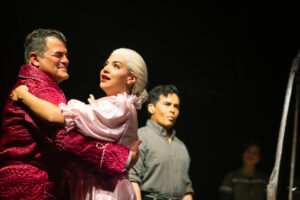
In number after number, Che’s obvious doubt and disenchantment with Eva only continues to grow. His version of the truth about Eva takes a particularly bitter twist in the darkly funny “Goodnight and Thank You” where he sings of her numerous one-night stands as she climbs the success ladder via the bedroom, with his taking on a near clownish persona to underline the circus atmosphere of a whole line-up emerging one-by-one from her dressing room struggling to put back on their pants.
Alex Rodriguez never falters to score big with impressive vocals each time he emerges from his observer-in-the-shadow role to take on one of several, other roles (protester, journalist, etc.), often reaching into heavenly heights with a tenor voice that sounds so sweet even as it decries Eva’s efforts for the poor (“Little has changed for us peasants on the ground”).
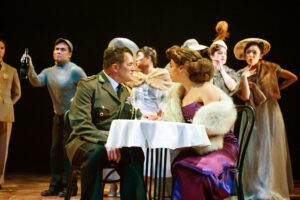
The focus of his scorn and of course the real star of the show, Eva, is played with impressive versatility of vocal expression by Sophia Alawi. When we first meet her as a girl of fifteen, Sophia Alawi’s Eva very much has a youthful, yet untested quality in her voice; but as she begins to see that small-town life is no longer for her, her voice rises to cut through the air with an edge and determination to tell everyone that Eva Duarte is going to control her own destiny and like a bird, “fly out of here” “to be a part of B.A., Buenos Aires, Big Apple.”
When she meets and then convinces Perón that she is the right one for him, Eva’s vocals are now mature, seductive, and even a bit conniving as she reels in her big catch, with eyes locked on her succumbing prey (“I’d Be Surprisingly Good for You”). After she triumphs as the new First Lady having convinced her radio audiences and growing minions that her now-husband should be President, Sophia Alawi soars in her resoundingly powerful voice as she pounds into their collective consciousness, “He supports you, for he loves you, understands you, is one of you” (“A New Argentina”).
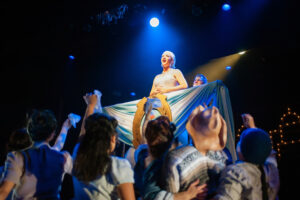
When in the second act we finally get to hear her sing “Don’t Cry for Me Argentina,” the emotion of her voice is magnificently matched in the radiance Eva emits from her entire presence. That ability to express so many amplified messages just through her stellar acting prowess continues to shine forth in numbers like “High Flying, Adored” and “Rainbow High,” with Sophia Alawi’s Eva now stirringly singing also with increased vibrato as her Eva commands more and more attention.
But she and Che have their best moments among many great ones when the two face off against each other. That is particularly true when the two sing and dance a tango in a number that is much like a duel of opposing forces (“Waltz for Eva and Che”), with it never being clear who is actually leading whom as they aggressively fight it out as to whom can out-tango, out-maneuver, and out-truth the other.
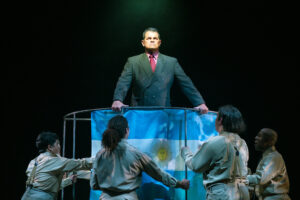
Against these two, powerhouse leads, this production’s Perón fails to impress to the same degree, even though Peter Gregus arrives with a long line of Broadway and TV successes to his credit (e.g. one of the original Jersey Boys, which he played all eleven years on the Great White Way). His vocals lack the rich, baritone muster that one associates with the role; and he never totally convinces that he is a powerful leader in a sung speech like “On the Balcony of the Casa Rosado.” Also, the electricity that should light up between him and Eva is barely a spark. It is only as he supports her during her final, gripping broadcast on his bended knees with arms wrapped around her legs that his Perón at last is truly persuasive of his true love for and devotion to her.
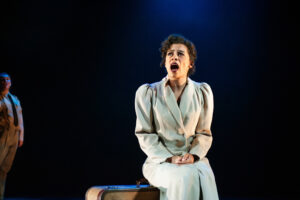
Vocally, there are other notable stars in this production, even in their brief appearances. As Eva’s first lover Magaldi, Jurä Davis sings a flowing, exotically intoxicating “On This Night of a Thousand Stars” and a cautionary but caring “Eva, Beware of the City.” Chanel Tilghman sings with lyrical, fluttering beauty as the jilted Mistress of Perón who must give way to the usurping Eva and now wonders, “Where Am I Going To?” The same actress sings with heart-breaking sweetness, “Please, Mother Eva, will you feed a hungry baby?” as a street-poor mother holds her baby up to a sympathetic Eva (“Santa Evita”). This is an insightful insertion and one of many twists to the original by Director English like a final set of memories that rotate in front of a dying Eva, as we hear snippets of songs by those who have been a part of her life.
A large ensemble of twelve plays multiple parts as the men and women of Argentina – admiring peasants, stern-faced military officers, gown-and-mink-wearing aristocracy, one-time grinning and now escaping lovers of Eva. The award-worthy choreography of Nicole Helfer so well executed by this Chorus time and again reigns supreme in numbers that show off their hip-sassy, body swishing sexiness through swinging salsa (“Buenos Aires”); high-browed snobbery of tightly coordinated women in their minks coupled with goose-stepping brassiness of military men (“Peron’s Latest Flame”); and the pulsating moves illustrating “rolling, rolling, rolling” giving way to high jumps, big kicks, and skirts a-flying in “And the Money Kept Rolling In.” The vocals of the ensemble are also consistently impressive with both big, bombastic sounds and closely blended, near-discordant harmonies (Dave Dobrusky, Music Coordinator).
The mostly empty, black-background staging provides the Chorus plenty of room to shine as well provide space for frequent forays of stage-crossing, Argentinian tangos by Perón and Eva, Che and Eva, and other couples. A dominating, oft-appearing giant bed that swings around to be a podium for Eva to speak to the masses is scenic designer Heather Kenyon’s clever, effective reminder that the bed is Eva’s prime staircase to stardom and success.
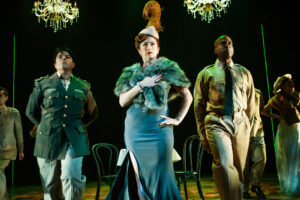
Embedded LED columns provide Michael Oesch many opportunities to accentuate in declarative, changing colors one of Che’s remarks or to shift the scene’s mood from joyful to shocking to sad. When Eva sings over a radio or an arena’s microphone, James Ard’s fantastic sound design provides the sense of either broadcast or of the echoes of a grand, outdoor space. Finally, sustained applause of much appreciation goes to the huge array of costumes designed so meticulously by Abra Berman to illustrate the period and the geography as well as the various economic and social classes represented. Particularly wowing are the high-styled, color-popping gowns worn by Eva – a number of which are changed on the spot by a bevy of mirror-circling dressers in the fabulously-directed “Rainbow High.”
Whether this is the tenth or the first time for an audience member to enjoy Webber and Rice’s world-renowned Evita, Bill English and San Francisco Playhouse’s Evita is a summer outing that will thrill its audiences with full-voiced singing, big-stage dancing, dazzling visuals, and some new takes on a near-fifty-year-old story.
Rating: 4.5 E
A Theatre Eddys Best Bet Production
Evita continues through September 7, 2024, in a two-hour (plus intermission) production by San Francisco Playhouse, 450 Post Street, San Francisco. Tickets are available at www.sfplayhouse.org or by calling the box office at 415-677-9596 Monday – Friday, 1:00 – 6:00 p.m.
Photo Credits: Jessica Palopoli

Leave a Reply